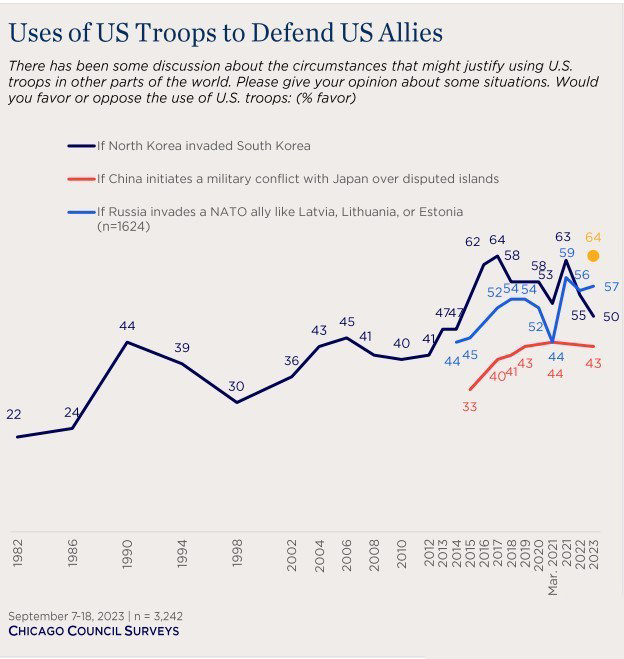Increasing US isolationism
More than half of supporters of the U.S. opposition Republican Party were found to be opposed to deploying U.S. troops to defend South Korea when North Korea invades it. With the reemergence of former President Donald Trump ahead of next year’s presidential election and the spread of ‘isolationism’ and ‘America First’ trends, the mood in the United States to defend allies, including Korea, is weakening. However, former President Trump’s key foreign affairs and security advisers emphasized that security cooperation between Korea, the United States, and Japan, such as the ‘Camp David Principles’, should continue.
According to the Chicago Council on Global Affairs (CCGA), a think tank specializing in U.S. diplomacy, on the 4th (local time), according to a survey of 3,242 U.S. adults from September 7 to 18, the majority said, “If North Korea invades South Korea, the U.S. military should defend South Korea.” The response was 50%. It was 63% in the same survey in 2021 and 55% last year. 49% were ‘opposed to the US military’s defense of Korea’.
The sharp decline in support for the U.S. military’s defense of Korea is interpreted as the result of the U.S. Republican Party’s strengthening isolationist and America-first tendencies. While 57% of supporters of the ruling Democratic Party supported U.S. military defense of Korea, only 46% of Republicans supported it. On the other hand, 53% of Republican supporters said they opposed the U.S. military’s defense of Korea.
As of 2021, the percentage of Republican supporters who support the defense of Korea by the U.S. military was 68%, which was higher than that of Democratic supporters (61%), but it plummeted to 54% last year and fell further this year. ‘Support for the stationing of U.S. troops in Korea’ also dropped significantly from 77% in 2022 to 63% this year.
Voices opposing the deployment of U.S. troops in allied conflicts have not only become stronger in Korea. In the event of an armed conflict between China and Japan, 55% opposed that the US military should intervene to defend Japan. “Partisan divisions over the defense of America’s allies are growing,” CCGA said. “This is a new phenomenon,” he said, adding, “Republicans believe it is more important to use the U.S. military to stop illegal immigration (from Central and South America).”
 Capture from the Chicago Council on Global Affairs (CCGA)
Capture from the Chicago Council on Global Affairs (CCGA)As the isolationist tendency within the United States becomes stronger, there are many concerns that if former President Trump returns to power in next year’s presidential election, alliance risks such as a retreat in security cooperation between Korea, the United States and Japan or a reduction in U.S. troops stationed in Korea will become more serious. However, there was also a rebuttal from Trump’s personnel.
Robert O’Brien, who served as White House national security adviser during the Trump administration, said in a conversation at the Institute for the Study of Korea and the United States (ICAS) on this day, “I am aware of the concerns that the United States is becoming increasingly isolationist,” but added, “America’s greatest strength is that it has true allies.” said. He continued, “Although we are critical of the Joe Biden administration, the Camp David Agreement is an achievement worthy of praise,” and emphasized, “It was built on the foundation established during the Trump administration.”
At the same time, after the Moon Jae-in administration declared the termination of the GSOMIA (Korea-Japan Military Information Security Agreement) in 2019, the security chiefs of Korea, the United States, and Japan met at the White House and then met with then-President Trump to explain the importance of the ROK-US and US-Japan alliances and Korea-US-Japan cooperation. It was also made public.
Former aide O’Brien said that the trilateral cooperation between Korea, the United States and Japan is “the most important security relationship for the United States, along with the Quad (QUAD) AUKUS” and that “Korea is expected to join Ocus, a security cooperation group in which the United States, the United Kingdom and Australia participate, along with Canada and Japan.” “I expect it,” he said.
Regarding the North Korean nuclear issue, he said, “The Trump administration was closest to achieving the goal of denuclearization,” but pointed out, “No U.S. administration has been able to reach the goal of denuclearization since the Bill Clinton administration squandered its last and best opportunity to stop North Korea’s nuclear development.”
Washington =
Source: Donga
Mark Jones is a world traveler and journalist for News Rebeat. With a curious mind and a love of adventure, Mark brings a unique perspective to the latest global events and provides in-depth and thought-provoking coverage of the world at large.